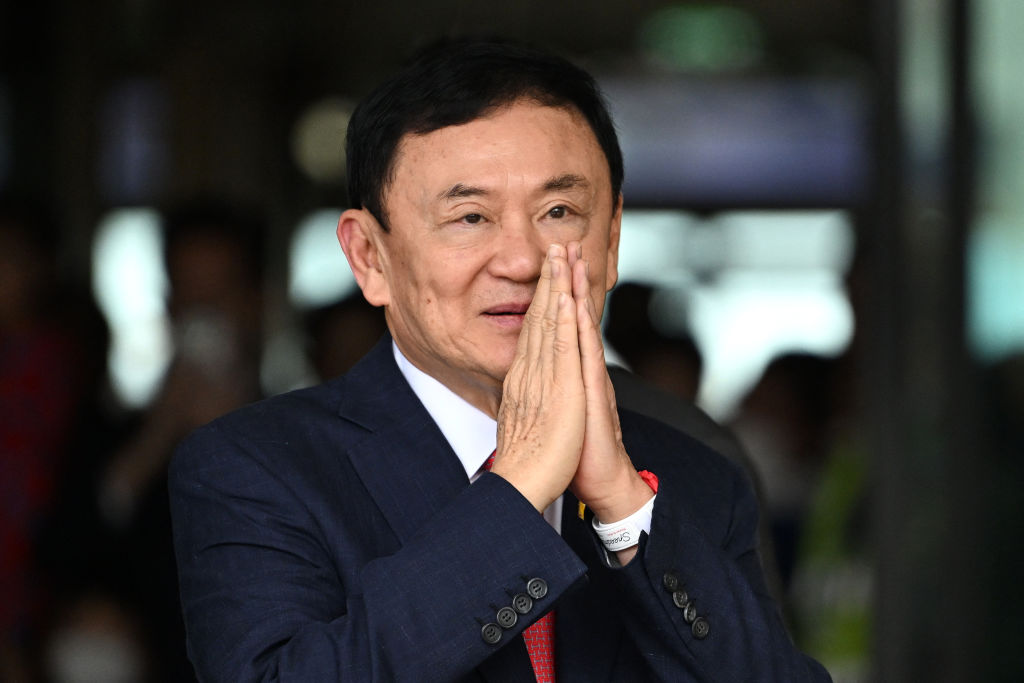
Thaksin Shinawatra, Thailand’s convicted ex-prime minister, is poised for early release from prison after the justice ministry included him in a list of prisoners eligible for suspended jail terms, the second concession granted to the ex-leader since his return from exile last year.
Thaksin meets the criteria for a suspension of his remaining sentence as he’s more than 70 years old and is suffering from chronic illness, Justice Minister Tawee Sodsong said on Tuesday. The former premier is on the list of 930 people who have been approved to receive clemency, he said.
“The director general of the Corrections Department has already submitted the jail suspension proposal, that was approved” by a commission, the minister said. Asked when Thaksin will be freed, Tawee said: “we have to see the date again. He will automatically receive the jail term suspension as soon as he completed his six-month jail time.”
Read More: Exiled Former Thai Leader Thaksin Shinawatra Trades Democratic Progress for Return Home
The former prime minister, 74, has served about six months of his sentence since arriving in Thailand on Aug. 22. He was moved to a police hospital within hours of being lodged in a Bangkok prison after complaining of chest pain and high blood pressure.
Thaksin was sentenced to eight years in jail on graft charges on his return from 15 years in self exile. He was granted a partial royal pardon in September by King Maha Vajiralongkorn that saw his sentence being commuted to just one year.
Thailand’s current leader Srettha Thavisin, who heads a coalition led by Pheu Thai Party—effectively helmed by Thaksin—said separately on Tuesday that the suspension of Thaksin’s sentence is in line with the law.
“It’s his right,” Srettha told reporters after a cabinet meeting in Bangkok, adding that Thaksin had served his term and will be able to lead a normal life after his release.
Whenever he’s released, his movements are likely to be closely tracked over what observers have said is an attempt by the authorities to prevent any challenges to the nation’s long held conservative status quo.
Earlier this month, authorities said they were considering prosecuting Thaksin for allegedly insulting the monarchy over comments he made almost a decade ago. The move came days after a top court ordered the country’s main opposition Move Forward Party to cease all attempts to amend the country’s stringent royal insult law—a campaign promise that helped it sweep 40% of popular votes in the general election in May.
A controversial but enduring figure in Thai politics, Thaksin is the head of the Shinawatra clan that has dominated national elections only to be routinely unseated from power. His homecoming was seen as part of a deal with the military establishment that ousted him in 2006 and his sister Yingluck Shinawatra’s government in 2014.
Hours after Thaksin’s return to Thailand, Srettha was elected as the nation’s new prime minister after months of political deadlock. Thaksin’s youngest daughter Paetongtarn Shinawatra took the helm of Pheu Thai last year, further strengthening the clan’s grip on power.
During his hospital stay, Thaksin underwent two surgeries, and Paetongtarn said in September the family was looking into a possibility of seeking Thaksin’s early release on parole.
According to Thai laws, prisoners who have served at least two-thirds of their sentences may be released early under probation. Additionally, prisoners who are at 70 years or older and suffer from severe illnesses may also be eligible for release after serving at least six months, or a third of their sentences.
More Must-Reads from TIME
- Inside Elon Musk’s War on Washington
- Meet the 2025 Women of the Year
- The Harsh Truth About Disability Inclusion
- Why Do More Young Adults Have Cancer?
- Colman Domingo Leads With Radical Love
- How to Get Better at Doing Things Alone
- Cecily Strong on Goober the Clown
- Column: The Rise of America’s Broligarchy
Contact us at letters@time.com